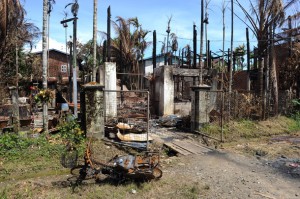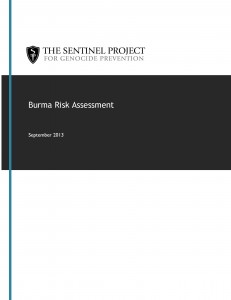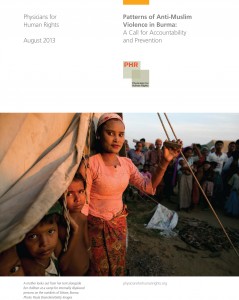Posts Tagged ‘Rohingya’ (311 found)
Joint Statement on Aung San Suu Kyi’s Outrageous Remarks on Muslims
Burmese Rohingya Organisation UK (BROUK) and Arakan Rohingya National Organisation (ARNO) strongly condemn Burmese opposition leader Daw Aung San Suu Kyi for her outrageous comments on Muslims in an interview with BBC on Thursday, 24 October 2013.
Her remarks on Burma’s peaceful living Muslim minority communities are full of prejudice based on fanatical patriotism and islamophobia […]
• • •Aung San Suu Kyi and EU Parliament Urged to Place Human Rights, Anti-Muslim Violence at the Top of the Agenda of European Visit
Legislators from across Southeast Asia today called on Aung San Suu Kyi and European Parliamentarians and leaders to use the National League for Democracy (NLD) leader’s visit to Europe to secure greater commitments to tackle persistent human rights concerns in Myanmar, and draw particular focus on growing sectarian conflict and anti-Muslim violence there […]
• • •Only One Side of the Story of Reform in Burma
By Khin Ohmar
The statement by Burma’s Minister for Foreign Affairs, Wunna Maung Lwin, on 13 September at the 24th session of the United Nations Human Rights Council, on the country’s recent reforms or “progressive developments,” made for interesting reading. Indeed, it seems to suit many, not least the Burma government, to impose a simplistic narrative on events in the country over the last two years. Yet such a narrative is only one side of the story […]
• • •Fresh Violence in Arakan State Belies Government’s Disingenuous Assurances to UN Human Rights Council
 A resurgence of inter-communal violence in Arakan State on 1 and 2 October has left six Muslims dead and dozens of homes destroyed, with mobs setting fire to houses in several villages in Sandoway Township just hours before President Thein Sein was due to arrive for an official visit to the beleaguered region. Calm has now been restored, but suspicions and tension remain between Muslims and Buddhists, while nearly 500 people have been left homeless and many others reportedly injured or missing.
A resurgence of inter-communal violence in Arakan State on 1 and 2 October has left six Muslims dead and dozens of homes destroyed, with mobs setting fire to houses in several villages in Sandoway Township just hours before President Thein Sein was due to arrive for an official visit to the beleaguered region. Calm has now been restored, but suspicions and tension remain between Muslims and Buddhists, while nearly 500 people have been left homeless and many others reportedly injured or missing.
What differentiates this latest outbreak of violence from previous ones is that this time the ethnic Rohingya, who bore the brunt of the violence in June and October 2012, were not on the receiving end. Rather, according to local NLD representative Win Laing, “They are Kaman [Muslims], they are ethnic nationals—not outsiders.” Yet, despite evidence to the contrary, namely that the victims were of a different ethnicity this time and that Buddhist gangs initiated the violence, the government line is that so-called illegal Muslim immigrants – or Rohingya – are to blame for the violence. “Bengali people wanted to create violence now,” claimed Win Myaing, Arakan State government spokesperson […]
The Dark Side of Transition: Violence Against Muslims in Myanmar
In its latest report, The Dark Side of Transition: Violence against Muslims in Myanmar, the International Crisis Group examines the recent violence against Muslim communities. Anti-Muslim violence is nothing new in Myanmar but has been growing in the past two years, the product of reduced authoritarian controls and a history of intolerant Burman/Buddhist nationalism. Issued on the day President Thein Sein begins a visit to Rakhine State, the centre of much violence, this report urges a stronger government effort to combat bigotry and protect its Muslim population […]
• • •Burma Update: Serious Crimes Continue
This briefing paper summarizes crimes that have been committed in Burma over the last year. It details the ongoing abuses and restrictions against Rohingyas, continuing anti-muslim violence, restrictive legislations being used to arrest and prosecute activists, farmed and human rights defenders, and the Burma Army’s offensives against the Kachin Independence Army and other non-state armed groups despite peace agreements.
• • •Statement on the Situation of the Rohingya in Burma
The United States Holocaust Memorial Museum today expressed its deep concern about the worsening situation of the Rohingya in Burma, also known as Myanmar.
Long considered one of the world’s most persecuted peoples, the Muslim Rohingya have no legal status in Burma and face severe discrimination, abuse, and escalating violence. Last year, violent attacks, fanned by a campaign of virulent anti-Muslim hate speech that continues today, destroyed numerous Rohingya communities and displaced well more than 100,000 people […]
• • •Burma Risk Assessment
 Following extensive research, the Sentinel Project has concluded that the risk of genocide or related mass atrocities in Burma is extremely high. Despite recent democratic reforms in the country, violence, discrimination, and extrajudicial killings continue and are mostly directed toward the Muslim Rohingya minority in Rakhine state. Violence and other crimes against the Rohingya, which are conducted by both state and non-state groups, are both widespread and systematic […]
Following extensive research, the Sentinel Project has concluded that the risk of genocide or related mass atrocities in Burma is extremely high. Despite recent democratic reforms in the country, violence, discrimination, and extrajudicial killings continue and are mostly directed toward the Muslim Rohingya minority in Rakhine state. Violence and other crimes against the Rohingya, which are conducted by both state and non-state groups, are both widespread and systematic […]
PHR Documents Systematic Patterns of Anti-Muslim Violence in Burma
New Report Shows Government’s Failure to Protect Muslims From Widespread Attacks
Physicians for Human Rights (PHR) today released a report documenting the recent wave of violence against Muslims throughout Burma, whose government has created a culture of impunity for the violators and has failed to protect the Muslim minority.
The report details a number of serious human rights violations that have taken place over the last two years, which have resulted in the displacement of nearly 250,000 people and the destruction of more than 10,000 homes, scores of mosques, and a dozen monasteries […]
• • •Patterns of Anti-Muslim Violence in Burma: A Call for Accountability and Prevention
 In this report, PHR documents how persecution of and violence against the Rohingya in Burma has spread to other Muslim communities throughout the country. PHR conducted eight separate investigations in Burma and the surrounding region between 2004 and 2013. PHR’s most recent field research in early 2013 indicates a need for renewed attention to violence against minorities and impunity for such crimes […]
In this report, PHR documents how persecution of and violence against the Rohingya in Burma has spread to other Muslim communities throughout the country. PHR conducted eight separate investigations in Burma and the surrounding region between 2004 and 2013. PHR’s most recent field research in early 2013 indicates a need for renewed attention to violence against minorities and impunity for such crimes […]









 All posts
All posts